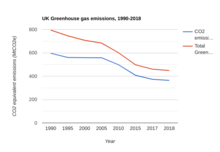Greenhouse gas emissions by the United Kingdom
In 2017 net greenhouse gas emissions in the United Kingdom were 464 million tonnes CO2 equivalent.[2] Emission in the UK decreased in the 2010s due to the closure of almost all coal-fired power stations,[3] but as of 2018 emissions per person were still above the world average.[4]
.jpg)

The UK has committed to carbon neutrality by 2050[5] and the Energy and Climate Intelligence Unit (ECIU) has said it would be affordable.[6] However ,as of March 2020 the UK was not on track for its 2030 commitments of 61% of 1990 levels.[7] As part of an economic stimulus to attempt to get out of the coronavirus recession a green industrial policy is being considered.[8]
Before Brexit, policies to decrease emmissions were covered by the Nationally Determined Contributions mechanism in the European Union, however, the government has yet to produce a new post-Brexit plan.[7]
Current targets
The Climate Change Act 2008 set the country's emission reduction targets. The "legally binding" targets are a reduction of at least 100% by 2050 (against the 1990 baseline).[9]
It also mandates interim, 5-year budgets. The first five are as follows:[10]
| Budget | Carbon budget level | Reduction below 1990 levels |
|---|---|---|
| 1st carbon budget (2008 to 2012) | 3,018 MtCO2e | 25% |
| 2nd carbon budget (2013 to 2017) | 2,782 MtCO2e | 31% |
| 3rd carbon budget (2018 to 2022) | 2,544 MtCO2e | 37% by 2020 |
| 4th carbon budget (2023 to 2027) | 1,950 MtCO2e | 51% by 2025 |
| 5th carbon budget (2028 to 2032) | 1,725 MtCO2e | 57% by 2030 |
The European Union has its own emissions target, which helps to direct the European Union Emission Trading Scheme. As of 2020 whether the UK carbon market will be linked to the EU ETS has not yet been decided.[11]
Criticism of targets
Production targets have been criticised for ignoring the emissions embodied in imports, thereby attributing them to other countries, such as China.[12] One report showed that Britain's imports are responsible for more overseas emissions than those of any other European country, and should add an extra 4.3 tonnes CO
2 to the average 5.4 tonnes per capita.[13][14]
Past performance
The graph above shows the annual figures for carbon dioxide emissions since 1990. It excludes carbon emissions from international aviation and international shipping, which together rose by 74.2% from 22.65 to 39.45 million tonnes of carbon dioxide between 1990 and 2004.[15] Reductions in methane emissions are largely due to a decline in the country's coal industry and to improved landfilling technologies.[16]
See also
References
- "2018 UK Greenhouse gas emissions, Provisional figures" (PDF). 28 March 2019. Retrieved 12 January 2020.
- "Summary of GHG Emissions for United Kingdom of Great Britain and Northern Ireland" (PDF). UNFCCC.
- Harrabin, Roger (5 February 2019). "Climate change: UK CO2 emissions fall again". Retrieved 5 January 2020.
- "Where in the world do people emit the most CO2?". Our World in Data. Retrieved 25 January 2020.
- Harrabin, Roger (12 June 2019). "UK commits to 'net zero' emissions by 2050". BBC News. Retrieved 26 January 2020.
- "Net zero: economy and jobs". Energy & Climate Intelligence Unit. Retrieved 5 January 2020.
- "Meaningless or sensible? Net zero by 2050 divides climate community". Reuters. 6 March 2020. Retrieved 7 June 2020.
- Harrabin, Roger (6 May 2020). "UK warned over coronavirus climate trap". BBC News. Retrieved 9 May 2020.
- "Carbon budgets: how we monitor emissions targets". committee on climate change. Retrieved 8 January 2020.
- Carbon budgets - Department of Energy and Climate Change. Decc.gov.uk. Retrieved on 2010-11-04.
- "Saving the planet the Brexit way". www.ft.com. Retrieved 9 May 2020.
- Black, Richard (9 March 2010). "Third of EU emissions 'imported'". BBC News.
- Sample, Ian (8 March 2010). "UK import emissions are the highest in Europe, figures show". The Guardian. London.
- "Analysis: UK's CO2 emissions fell for record sixth consecutive year in 2018". Carbon Brief. 4 March 2019. Retrieved 13 January 2020.
- defra Archived 26 September 2007 at the Wayback Machine, published January 2006.
- Environmental Change Institute (ECI) - Oxford University Archived 23 February 2010 at the Wayback Machine. Eci.ox.ac.uk (2006-10-24). Retrieved on 2010-11-04.